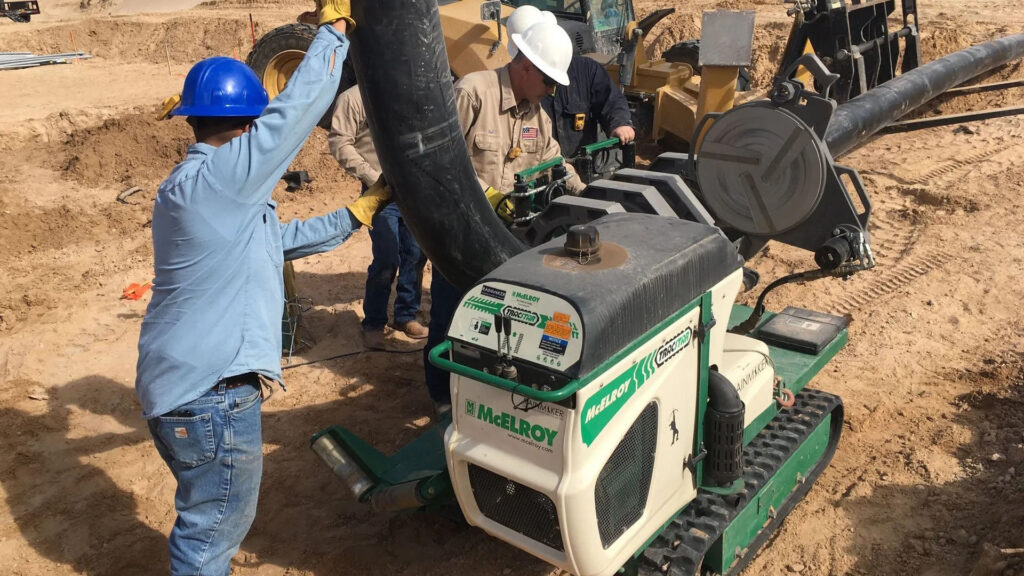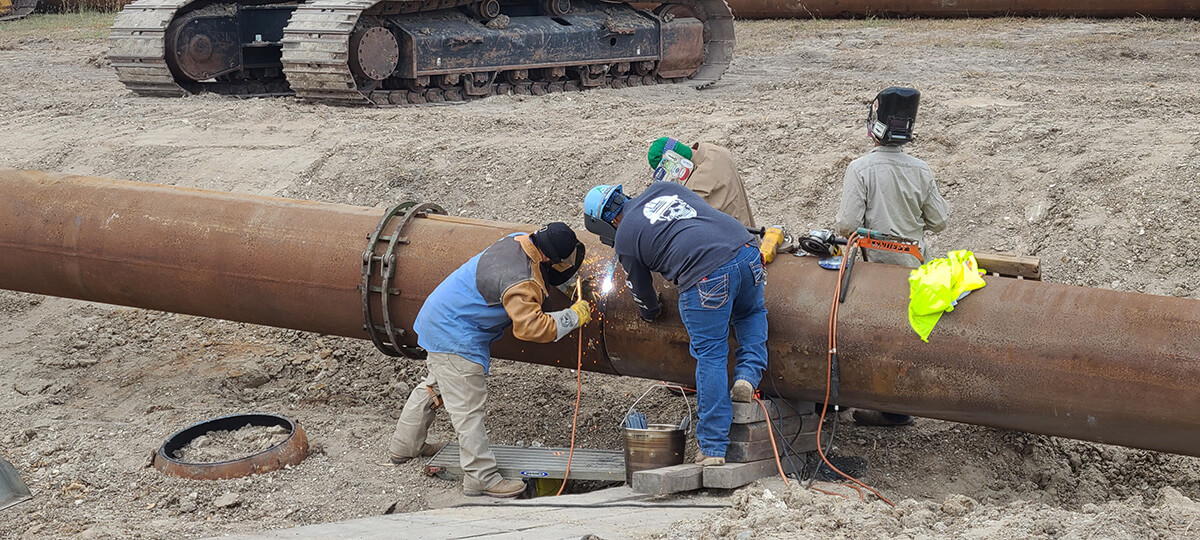The Necessary Overview to Comprehending Pipeline Construction Providers and Their Significance
Pipeline Construction solutions are fundamental to the transport of vital sources such as gas, water, and oil. These solutions involve meticulous preparation and implementation, adhering to rigid safety and environmental criteria. As the market adapts to modern-day challenges, recognizing its components and ramifications comes to be progressively essential. What factors add to the growing significance of these solutions in today's economic situation? The complying with sections will certainly check out these vital aspects.
Overview of Pipeline Construction Providers
Pipeline Construction solutions include a variety of activities important for the installation and maintenance of pipes made use of to transport different materials, consisting of gas, oil, and water. These solutions are important for assuring the secure and efficient motion of resources from one location to an additional. The procedure generally begins with thorough preparation and style, which takes right into account regulatory needs, environmental factors to consider, and logistical challenges.
Excavation and grading of the land are performed to prepare the site for Pipeline installment once planning is total. This is followed by the actual laying of the pipes, which entails welding or joining sections with each other to develop a continuous circulation course. After installation, extensive screening is carried out to assure integrity and security. Upkeep services are additionally offered to deal with any type of problems that may emerge over time. Overall, Pipeline Construction services play a critical function in sustaining framework for power and water distribution.
Key Parts of Pipeline Construction
An effective Pipeline Construction task relies upon a number of essential parts that guarantee the risk-free and efficient installation of the Pipeline system. Initially, complete website assessments are vital, as they identify the geographical and environmental elements that may influence Construction. Next off, the option of ideal products, such as pipes and fittings, is necessary for protecting longevity and compatibility with the moved materials.
Progressed Construction techniques, consisting of trenchless technology and directional boring, boost effectiveness and minimize environmental influence. Effective job management is another important component, collaborating labor, devices, and timelines to satisfy project goals.
Additionally, interaction amongst stakeholders, consisting of designers, professionals, and regional authorities, warranties placement on job specifications and requirements. Lastly, comprehensive quality assurance steps throughout the Construction procedure guarantee conformity with industry requirements and make best use of the Pipeline's functional life expectancy. Jointly, these parts form the foundation of a successful Pipeline Construction job.
Safety And Security Criteria and Rules in Pipeline Construction

Improving Governing bodies, such as the Occupational Security and Wellness Administration (OSHA) and the Pipeline and Hazardous Products Safety And Security Administration (PHMSA), stated specific demands that control Construction methods. These consist of procedures for devices usage, worker training, and emergency response procedures. By executing these requirements, Construction business not only safeguard their workers however likewise protected public depend on. Eventually, extensive security steps add to the long-lasting success of Pipeline jobs, ensuring they satisfy both ecological and operational expectations.
Environmental Considerations in Pipeline Projects

Environmental considerations are important to the preparation and implementation of Pipeline tasks. These projects have to examine possible impacts on ecosystems, water sources, and regional wildlife. Carrying out complete environmental impact evaluations (EIAs) is important, permitting stakeholders to determine and mitigate threats prior to Construction begins.
Shielding sensitive locations, such as environments and wetlands, often calls for executing details style attributes or alternate transmitting to decrease interruption. In addition, Pipeline operators are tasked with creating techniques for protecting against spills and leaks, which can have destructive impacts on the environment.
Interaction with neighborhood communities is necessary, as public concerns can result in job alterations that enhance ecological defense. Compliance with policies set by ecological agencies guarantees that jobs fulfill sustainability standards, cultivating a balance in between framework requirements and environmental conservation. Inevitably, attending to ecological factors to consider not just safeguards nature but also advertises community count on and job feasibility.
The Duty of Technology in Pipeline Construction
Technology plays a vital duty in modern-day Pipeline Construction, improving performance and accuracy. Advanced evaluating techniques permit exact preparation and implementation, decreasing ecological influence and job delays. In addition, More hints the assimilation of automation and robotics streamlines operations, reducing labor costs and boosting safety and security on Construction websites.
Advanced Evaluating Strategies
Advanced evaluating methods play a crucial role in the successful execution of Pipeline Construction projects. These approaches utilize cutting-edge modern technology to guarantee precise mapping and evaluation of the surface where pipelines will be mounted. Techniques such as Geographic Info Equipment (GIS), LiDAR (Light Detection and Ranging), and 3D modeling make it possible for designers to picture and examine the landscape, identifying ecological issues and potential barriers. By using these advanced devices, groups can enhance precision in placing and positioning, substantially reducing the threat of mistakes throughout Construction. Furthermore, real-time information collection permits for immediate adjustments and informed decision-making throughout the project lifecycle. Ultimately, these surveying technologies add to enhanced efficiency, safety, and sustainability in Pipeline Construction efforts.
Automation and Robotics

Economic Effect of Pipeline Framework
Pipeline facilities plays an important role in facilitating and shaping regional economies profession. By providing a dependable means of moving oil, gas, and other products, pipes decrease transport prices and enhance supply chain effectiveness. This framework attracts financial investment, stimulates task production, and fosters financial growth in surrounding areas.
The Construction and maintenance of pipes contribute considerably to neighborhood economic situations, producing numerous work chances in various markets, from engineering to labor. The increase of tasks usually causes increased investing in neighborhood businesses, additionally bolstering economic task.
Furthermore, pipelines improve power safety by making certain a secure supply of sources, which is vital for residential demands and commercial procedures. As areas become interconnected with Pipeline networks, they get to wider markets, increasing competitiveness and economic resilience. As a result, the financial effect of Pipeline framework is multifaceted, affecting both immediate neighborhood economic climates and wider regional growth.
Future Patterns in Pipeline Construction Solutions
The future of Pipeline Construction services is evolving in response to technical advancements, regulatory adjustments, and expanding ecological considerations. Developments such as drones and robotics are enhancing examination and upkeep procedures, boosting safety and efficiency. Automation is poised to decrease labor costs and enhance precision in Construction operations. Furthermore, the raising focus on sustainability is triggering firms to embrace green products and techniques, straightening with worldwide initiatives to reduce carbon impacts.
Regulatory structures are also adjusting to deal with ecological impacts, promoting greater transparency and accountability in Pipeline jobs. In addition, the combination of clever technologies, consisting of real-time monitoring systems, is expected to boost the dependability and performance of Pipeline networks. As energy needs shift toward renewable resources, Pipeline Construction solutions will likely see an increase in projects related to biofuels and hydrogen transport. In general, these trends indicate a transformative duration for the Pipeline Construction industry, concentrated on technology and sustainability.
Regularly Asked Questions
What Sorts of Pipelines Are Generally Created?
Numerous kinds of pipelines are generally built, including oil, gas, water, and sewage pipes - Pipeline Construction Services. Each offers distinct objectives, facilitating the transport of crucial sources throughout areas while sticking to safety and security and environmental guidelines
Exactly how Long Does a Regular Pipeline Job Take?
The period of a common Pipeline task varies substantially, commonly ranging from several months to a few years. Elements affecting this timeline consist of task intricacy, regulatory approvals, and ecological considerations that must be addressed.
Who Regulates Pipeline Construction Firms?
Pipeline Construction business are controlled by various government, state, and regional companies, including the Pipeline and Hazardous Products Safety Management (PHMSA) and state public utility commissions, ensuring conformity with safety and security and ecological requirements throughout the Construction process.
What Prevail Products Utilized in Pipeline Construction?
Typical materials made use of in Pipeline Construction consist of polyethylene, pvc, and steel. Each material supplies distinctive advantages such as resistance, longevity, and adaptability to rust, making them ideal for various applications in try here transferring gases and fluids.

Just How Are Pipeline Construction Costs Estimated?
Pipeline Construction costs are estimated by evaluating elements such as material expenses, labor rates, project complexity, ecological factors to consider, and regulatory requirements (Pipeline Construction Services). Accurate cost estimation guarantees effective budgeting and task preparation throughout the Construction procedure
Pipeline Construction solutions incorporate an array of tasks essential for the installment and upkeep of pipes utilized to move numerous materials, consisting of gas, oil, and water. An effective Pipeline Construction task depends on several crucial parts that assure the efficient and secure installation of the Pipeline system. Advanced checking techniques play a crucial duty in the successful execution of Pipeline Construction tasks. Numerous types of pipes are generally constructed, consisting of oil, water, sewage, and gas pipelines. Pipeline Construction costs are estimated by assessing aspects such as product costs, labor prices, project intricacy, environmental factors to consider, and regulative requirements.